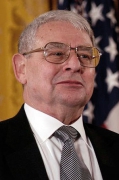Awards
- Nobel Prize - 2002
- Nobel Prize in Physics

Astrophysicist Riccardo Giacconi is a pioneer of X-ray astronomy who discovered that what was once thought to be a diffuse, smooth X-ray background from outer space is actually a rich collection of individual x-ray sources, including neutron stars, stellar black holes, and quasars. He also designed and led the development of major research telescope facilities to investigate these phenomena.
Giaconni grew up in Italy and earned a doctorate in physics from the University of Milano, where he became an assistant professor in the physics department. In 1956, he came to the United States on a Fulbright Fellowship to collaborate with physics professor R. W. Thompson at Indiana University. He worked on data analysis and the construction of a larger cloud chamber for cosmic ray research. He moved to Princeton University for another postdoctoral position in 1958.
In 1959 he joined the private firm American Science and Engineering. Over the next few years he discovered Scopius X-1, the first known source of X-rays form beyond our solar system, and Cygnus X-1, the first object to be generally accepted as a black hole. Giaconni worked on the development of instrumentation for X-ray astronomy beginning with rocket-borne detectors in the late '50s and early '60s, and progressing through Uhuru, the first orbiting X-ray astronomy satellite; the Einstein Observatory, the first fully imaging X-ray telescope put into space; and the Chandra X-ray Observatory, which was launched in 1999. He was also the founding director of the Space Telescope Science Institute, which oversaw the scientific operations of the Hubble space telescope/
His academic appointments include serving on the faculty at Harvard from 1973 to 1982 and at Johns Hopkins University from 1982 until the present. From 1993 to 1999 he was also director general of the European Southern Observatory.
Giaconni wrote: 'The fundamental steps in the dawn of X-ray astronomy remain in my mind: the brief review, theoretical and experimental, of X-ray astronomy (1960), the invention of the X-ray telescope (1960), and the 1963 plan for X-ray astronomy by (Herbert) Gursky and me. This plan laid out a program of experiments which went from rockets to Uhuru, Einstein, and Chandra.'
In 2002 he received the Nobel Prize in Physics 'for pioneering contributions to astrophysics, which have led to the discovery of cosmic X-ray sources.' He shared the prize with Masatoshi Koshiba and Raymond Davis Jr.
Giacconi is the author of three books: X-Ray Astronomy (1974); The X-Ray Universe (1985); and Secrets of the Hoary Deep: A Personal History of Modern Astronomy (2008).